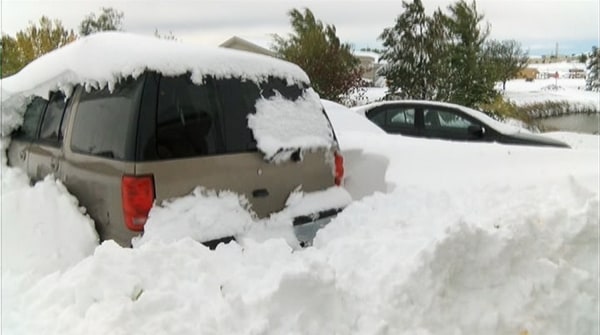South Dakota's cattle cataclysm: why isn't this horror news?

A dead cow is lifted from flooding in the aftermath of winter storm Atlas in South Dakota. Photograph: Lacey Weiss
If you aren't in the ag world, you most likely haven't heard about the
devastating loss that ranchers in western
South Dakota are struggling with after being
hit by winter storm Atlas.
For
some reason the news stations aren't covering this story. I don't
understand why they wouldn't. This story has heartbreak, tragedy and
even a convenient tie into the
current government shutdown. Isn't that what the news is all about these days?
But
the news isn't covering this story. Instead, it is spreading around on
social media, and bloggers are writing from their ranches in South
Dakota. Bloggers are trying to explain how the horrible happened. And
now I am going to join them to tell you the part of the story that I
know, and I am going to ask you to help these people, because if you are
here reading this, I know you give a crap about these people.
Last
weekend western South Dakota and parts of the surrounding states got
their butts handed to them by Mother Nature. A blizzard isn't unusual in
South Dakota, the cattle are tough and can handle some snow. They have
for hundreds of years.
Unlike on our dairy farm in Wisconsin, beef
cattle don't live in climate controlled barns. Beef cows and calves
spend the majority of their lives out on pasture. They graze the grass
in the spring, summer and fall and eat baled hay in the winter.
In
winter these cows and calves grow fuzzy jackets that keep them warm and
protect them from the snow and cold. The cows and calves live in
special pastures in the winter. These pastures are smaller and closer to
the ranch, and they have windbreaks for the cows to hide behind. They
have worked for cows for hundred of years.
So what's the big deal about this blizzard?
Read More Here
**********************************************
Up To 100,000 Cows Killed In Early S.D. Blizzard
 CBS Evening News
CBS Evening News
Published on Oct 14, 2013
Livestock farmers in South Dakota
are suffering after a record early blizzard that dumped four feet of
snow and killed tens of thousands of cattle. The government shutdown has
left ranchers unable to go to the government for help. Manuel Bojorquez
reports.
**********************************************
NBC News
Shutdown worsens historic blizzard that killed tens of thousands of South Dakota cattle

KNBN-TV
Rapid
City and many other parts of South Dakota recorded record snowfall
totals for the entire month of October in just three days over the
weekend.
By M. Alex Johnson, Staff Writer, NBC News
An
unusually early and enormous snowstorm over the weekend caught South
Dakota ranchers and farmers unprepared, killing tens of thousands of
cattle and ravaging the state's $7 billion industry — an industry left
without assistance because of the federal government shutdown.
As
many as 75,000 cattle have perished since the storm slammed the western
part of the state Thursday through Saturday with snowfall that set
records for the entire month of October in just three days, state and
industry officials said.
Across the state, snow totals averaged 30 inches, with some isolated areas recording almost 5 feet,
The Weather Channel reported.
The
South Dakota Stock Growers Association estimated that 15 percent to 20
percent of all cattle were killed in some parts of the state. Some
ranchers reported that they lost half or more of their herds.
The
storm was accompanied by hurricane-force wind gusts, especially Friday
night, which drove some herds seeking shelter miles from their ranches. A
trail of carcasses left a gruesome sight, said Martha Wierzbicki,
emergency management director for Butte County, in the northwestern
corner of the state.
Parts
of South Dakota are in cleanup mode after a strong winter storm pounded
some areas. Kirsten Swanson of NBC station KNBN reports.
"They're in the fence line, laying alongside the roads," Wierzbicki
told The Rapid City Journal. "It's really sickening."
Ranchers
have no one to ask for help or reimbursement. That's because Congress
has yet to pass a new farm bill, which subsidizes agricultural
producers.
Read More Here





No comments:
Post a Comment
Hello and thank you for visiting my blog. Please share your thoughts and leave a comment :)